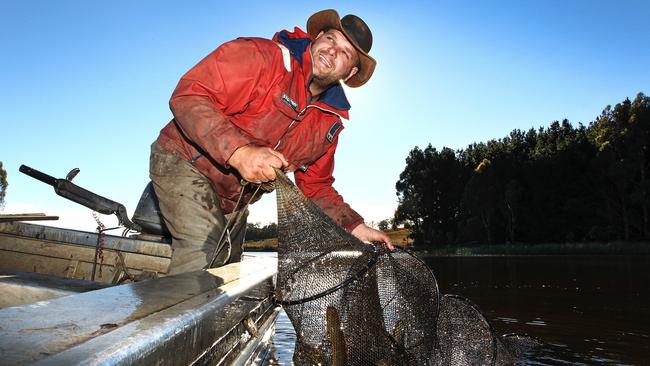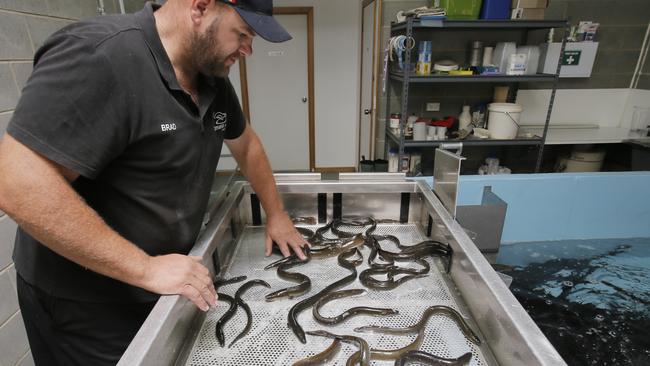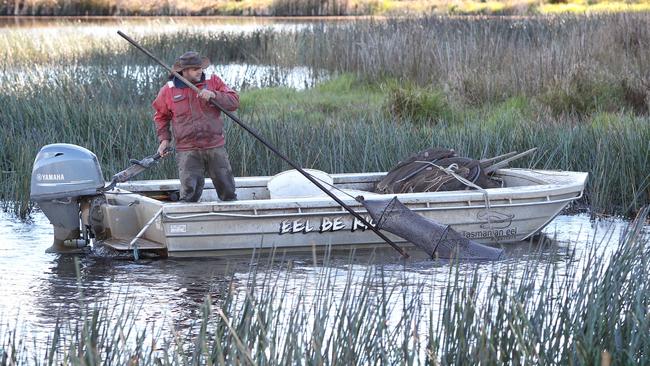Tasmanian eel fisherman Brad Finlayson fights animal cruelty charges in court
A Tasmanian eel fisherman has appeared in court to defend multiple animal cruelty charges, after he allegedly left bags of live fish submerged in a lake for almost two weeks back in 2022.

Tasmania
Don't miss out on the headlines from Tasmania. Followed categories will be added to My News.
The owner of a Tasmanian eel exporting company has appeared in a Hobart courtroom to defend multiple counts of animal cruelty, after he allegedly left multiple bags of live fish submerged in a lake for almost two weeks in late 2022.
Bradley Robert Finlayson, and his company Eels Australis, have both been charged with one count of using a method of animal management reasonably likely to result in unjustifiable pain or suffering, and one count of cruelty to animals, following a mass mortality event at Four Springs Lake outside Launceston in November 2022.

Mr Finlayson and the company have pleaded not guilty to the charges.
In the Magistrates Court in Hobart on Tuesday, prosecutors alleged that after Mr Finlayson had legally caught several tonnes of live eels during a fishing operation at the lake between October 10 and October 21, he stashed a proportion of his catch in shallow waters near the boat ramp.
The court heard that the stockpile was left for 13 days, when a pair of trout anglers were alerted to the odour of rotting fish.
Prosecutors said they would call expert veterinary and zoological witnesses, who would give evidence the eels had been kept in conditions with minimal water exchange, and suffered unreasonable pain during their storage.
But Mr Finlayson’s lawyers told Magistrate Reg Marron that because eels represented a bespoke area of the Tasmanian fishing industry, very few people in the state could provide evidence about appropriate management practices involving the species.
Defence counsel described Mr Finlayson as someone who was passionate about his industry, and told the court that nobody could say exactly how the eels at Four Springs Lake had died.

Witness Carl Hyland gave evidence that he and a friend had finished a day’s fishing at the lake on 3 November 2022, when the pair became aware of unusual smell near the boat ramp.
“Once we came off the water we noticed a very pungent odour, and upon inspection we found dead and dying eels in nets,” Mr Hyland said.
Mr Hyland, who writes a fishing column for the Mercury, told the court that he also noticed an oil slick and foam on water, and that after taking photographs of the scene, had phoned the Inland Fisheries Service to report the incident.
Under cross examination by Mr Finlayson’s lawyers, Mr Hyland conceded that he had not inspected the contents of all the bags in the area, but said the condition of those eels he did observe “was quite apparent”.
Mr Hyland said he was unaware of a severe weather event which had caused flooding at the lake two weeks before his visit.
Taking the witness stand, IFS officer Paul Middleton said that after being called to Four Springs Lake on 3 November, he found 44 bags of eels tied to 10 wooden stakes.
Mr Middleton said that while some bags remained submerged below the lake’s surface, others were noticeably buoyant.
“The fish in there were decomposing, and as they decompose they begin to float,” he explained.
The hearing continues.
More Coverage
Originally published as Tasmanian eel fisherman Brad Finlayson fights animal cruelty charges in court




